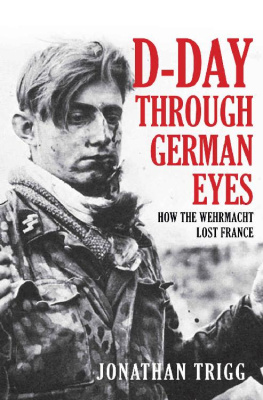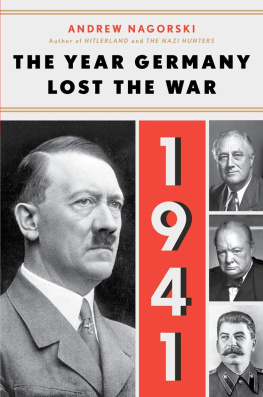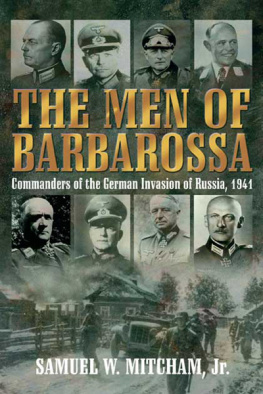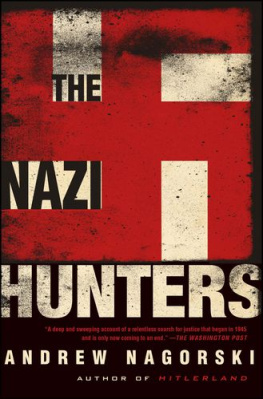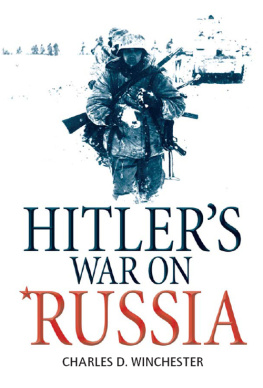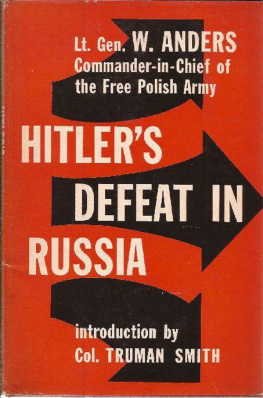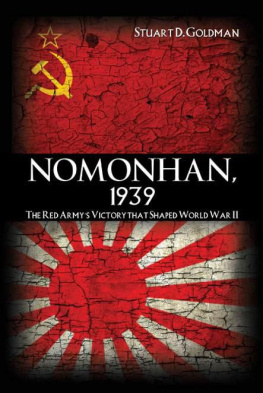Other books by Jonathan Trigg
Hitlers Legions series
Hitlers Gauls The History of the French Waffen-SS
Hitlers Flemish Lions The History of the Flemish Waffen-SS
Hitlers Jihadis The History of the Muslim Waffen-SS
Hitlers Vikings The History of the Scandinavian Waffen-SS
Hastings 1066
Death on the Don The Destruction of Germanys Allies on the Eastern Front 1941-44 ( nominated for the Pushkin Prize for Russian history )
The Defeat of the Luftwaffe The Eastern Front 1941-45; Strategy for Disaster
Voices series
Voices of the Flemish Waffen-SS: The Last Testament of the Oostfronters
Voices of the Scandinavian Waffen-SS: The Last Testament of Hitlers Vikings
Through German Eyes series
D-Day Through German Eyes: How The Wehrmacht Lost France
VE-Day Through German Eyes: The Final Defeat of Nazi Germany
For Tim, the best friend anyone could hope for,
and for Mike rest in peace.
Half-title page : Soviet civilians watch the invaders as their village burns behind them. (Authors collection)
Title page : Invasion Day. Nerves taut, a German section crosses the river to begin the largest invasion in history. (Authors collection)
First published 2021
Amberley Publishing
The Hill, Stroud
Gloucestershire, GL5 4EP
www.amberley-books.com
Copyright Jonathan Trigg, 2021
The right of Jonathan Trigg to be identified as the Author of this work has been asserted in accordance with the Copyright, Designs and Patents Act 1988.
All rights reserved. No part of this book may be reprinted or reproduced or utilised in any form or by any electronic, mechanical or other means, now known or hereafter invented, including photocopying and recording, or in any information storage or retrieval system, without the permission in writing from the Publishers.
British Library Cataloguing in Publication Data.
A catalogue record for this book is available from the British Library.
ISBN 9781398107229 (HARDBACK)
ISBN 9781398107236 (eBOOK)
Typeset in 10.5pt on 13.5pt Sabon.
Typesetting by SJmagic DESIGN SERVICES, India.
Printed in Great Britain.
Contents
Introduction
Midsummer 1941, Europe at war. Nazi Germany the state that had started the conflict had done what no other nation in history had ever accomplished, having conquered almost the entire Continent in a series of jaw-droppingly swift campaigns. After the crushing defeat of the First World War, an Austrian down-and-out jailbird turned demagogue had risen to power in Berlin and ordered Germanys new armed forces (the Wehrmacht ) into action. Hitlers aggression saw Denmark, Norway, Belgium, the Netherlands, Luxembourg, Yugoslavia-as-was, and Greece all conquered in less than two years. Even once-mighty France Germanys Erzfeind (arch enemy) had fallen. Added to the list were Czechoslovakia and Austria both swallowed up without a shot being fired and proud Poland, carved up between Berlin and its newfound ally, the Soviet Union, less than twenty years after re-emerging as an independent country after centuries of suppression and partition. As for the rest of mainland Europe, Portugal and Nationalist Spain were neutral but friendly, while Hungary and the kingdoms of Italy, Romania and Bulgaria were allies. With the United States gripped by isolationism, only Great Britain and her Empire now openly opposed the Nazi dictator.
Hed won. Hitler now controlled the Continent in a way that not even Napoleon or Julius Caesar had. Many of his own people including a significant number of senior military men remembered the two million dead of the First World War, and had been horrified at Hitlers thirst for conflict, yet even they were now in thrall to a leader who had defeated almost the entire West at a blood price of just one-third of the losses sustained at Verdun back in 1916.
Now was the time for Hitler to consolidate his gains, to focus on beating the British, and then establish the Thousand-Year Reich he boasted of.
Instead, the inveterate gambler made the biggest bet of them all. Massing the largest invasion force ever seen in history of the world, he flung it at the largest country in the world Joseph Stalins Soviet Union. This was Unternehmen Barbarossa Operation Barbarossa. Intended to be a lightning campaign lasting eight to ten weeks, Barbarossa foundered, and Nazi Germany and her allies were drawn into a blood-letting that had no parallel and ended in complete failure.
The reasons behind its failure centre on shockingly poor planning on the part of the Nazi state, and more specifically the German military, but the waters were muddied in the post-war period to protect a myth of Teutonic efficiency and instead create a very different narrative around Barbarossa, one that laid the blame for disaster squarely at Hitlers door alone. The leading proponents of this narrative included Franz Halder, Erich von Manstein and Heinz Guderian. These men were part of the senior leadership cadre for Barbarossa, and so had the most to gain by deflecting criticism away from themselves and onto a dictator who was conveniently dead, and had been laid bare to the world as the monster he truly was.
In very broad terms, the generals narrative, to give it a name, was that upon invasion, the Wehrmacht had swept deep into the Soviet Union at a pace hitherto unknown in warfare, winning huge victories on the way and taking the Germans to within an ace of success, when Hitler in a fit of near-lunacy threw it all away by abandoning the all-important drive on Moscow, and instead diverted his forces to Ukraine. There, around the city of Kiev, they would win the greatest military victory ever, but one that was doomed to be pyrrhic. Guderians own son Hans Gnther loudly parroted this line as a senior officer in West Germanys post-war Bundeswehr : All the senior officers at the time believed that the offensive on Moscow should continue. The turning point in the war was when the original plan to reach Moscow and take it was dropped by Hitler for something quite different.
The story continued that with winter fast approaching Hitler turned once more to Moscow. Now, the lack of time to capture the Soviet capital was compounded by the dictators earlier decision to delay Barbarossa and first invade Yugoslavia and Greece. However, by an almost superhuman effort, the Wehrmacht thrust at the capital, winning more enormous victories before finally being forced to halt by the onset of Russias General Winter, even with the onion domes and spires of St Basils Cathedral tantalisingly in sight. A massive Soviet counter-offensive then put paid to any hope of German success and set the seal on Barbarossas failure.
The generals narrative also stated that, simultaneous to the invasion itself, in the newly conquered territories a coalition of SS death squads and local anti-Semitic collaborators carried out a campaign of mass murder that slaughtered well over a million Soviet Jews, Communist Party officials and ordinary civilians. Alongside this planned programme of extermination, a terrible accident outside of the Wehrmacht s control was occurring as the millions of Red Army prisoners-of-war (POWs) captured by the Germans during their advance overwhelmed the material resources of their captors, leading to huge numbers of them tragically dying of thirst, hunger and disease.


